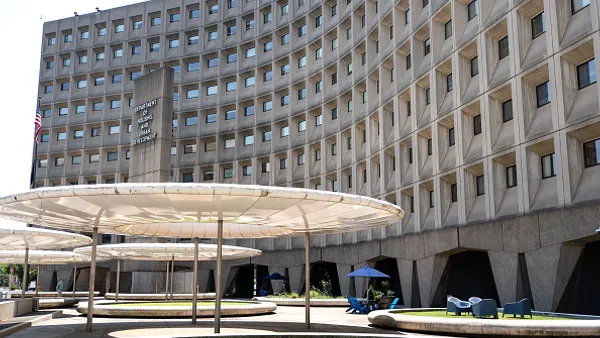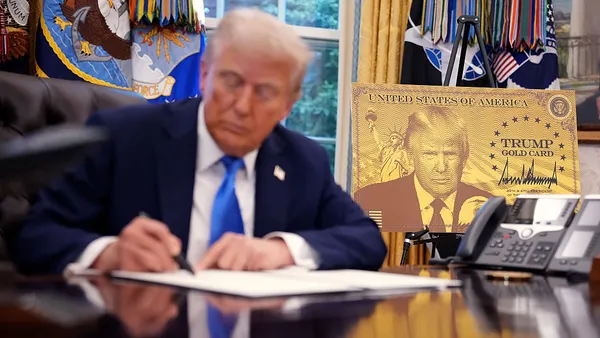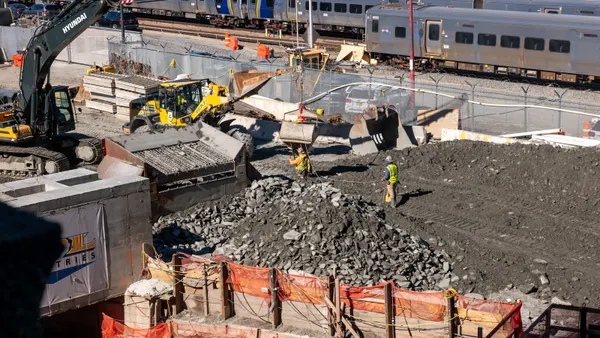Dive Brief:
- The White House Office of Management and Budget has approved two new scheduling letters for construction companies with federal contracts — one for contractors that have a direct contract with the federal government and one for those that are working on a project receiving federal assistance — following a March 2020 report in which the Department of Labor's Office of Inspector General found that the Office of Federal Contract Compliance Programs (OFCCP) did not sufficiently enforce the federal equal employment opportunity (EEO) law in federal contracts.
- The letter for those with a direct contract requires contractors to provide examples of employment activity along with gender, race and ethnicity; payroll records; job advertisements and postings; accommodation requests for pregnancy, childbirth, related medical conditions and for religious observances and practices; a copy of current Section 503 AAP (affirmative action plan) regarding individuals with disabilities; and a copy of the current VEVRAA (Vietnam Era Veterans' Readjustment Assistance Act) AAP. Contractors working on federally assisted projects do not have to provide the AAPs.
- The results of the report, combined with the issuance of new scheduling letters likely indicate that the OFCCP is getting ready to initiate a new round of audits to check for contractor compliance with EEO laws, according to attorney Rae Vann, a labor and employment law expert at Carlton Fields in Washington, D.C.
Dive Insight:
Exactly how quickly the OFCCP will send out the new scheduling letters is difficult to say, Vann said, but she assumes it will be as soon as reasonably possible. "A few things have to happen first," she said, "including the publication of scheduling methodology."
When the OFCCP first proposed these and other scheduling letters, it indicated that it wouldn't start issuing the letters until it had published the methodology. Vann said development of that methodology has likely been in the works since then, and, depending on the publication date, it could be weeks or months before the OFCCP starts sending the first scheduling letters.
And contractors shouldn't rely too much on the COVID-19 pandemic to give them much of a break as far as response time should they receive a letter.
"The OFCCP has been very deliberate in letting the contracting community know that the agency is still open for business," Vann said. Clients with open audits are still moving, although she suspects that the agency is aware that some smaller contractors might not have the technological capabilities for virtual meetings and interviews. Some contractors, due to stay-at-home orders, might not even have access to the records that the OFCCP is requesting.
As a practical matter, she said, before the OFCCP starts issuing letters, federal construction contractors should do a self-analysis and determine what records they have and where they are located. Large companies probably already have either in-house compliance departments or outside firms that have handled previous audits and recordkeeping issues, but smaller firms might want to reach out to a law firm or consultancy with this expertise.
For those contractors that might not even know they were supposed to be tracking and retaining EEO records, Vann said, some will have to "take a hit" where there are gaps. But, she added, contractors should check for information in their possession that simply has not yet been compiled.
The OFCCP does offer contractors free technical help in their efforts to comply, but Vann said that there's no guarantee the agency will not take action should they find violations in the course of that help. The agency has published guides to meeting OFCCP requirements, however, and those can be accessed online. Vann said the guide should help contractors understand their obligations and what to expect from the OFCCP.
After the agency reviews the information submitted in response to a scheduling letter, it typically will give one of three determinations, she said. It can find contractors in compliance, point out technical recordkeeping violations or find that there are substantive discrimination violations. If contractors don't respond to the OFCCP scheduling letters, Van said, in the extreme, they could see their contracts suspended or rescinded, face debarment or be subject to an administrative enforcement action, also known as an administrative trial.
By law, contractors are required to provide OFCCP access.
Contractors with federal contracts valued at more than $10,000, she said, are obligated under Executive Order 11246 to comply with EEO laws. In total, there are 16 EEO provisions to which contractors agree when they sign such a contract.












